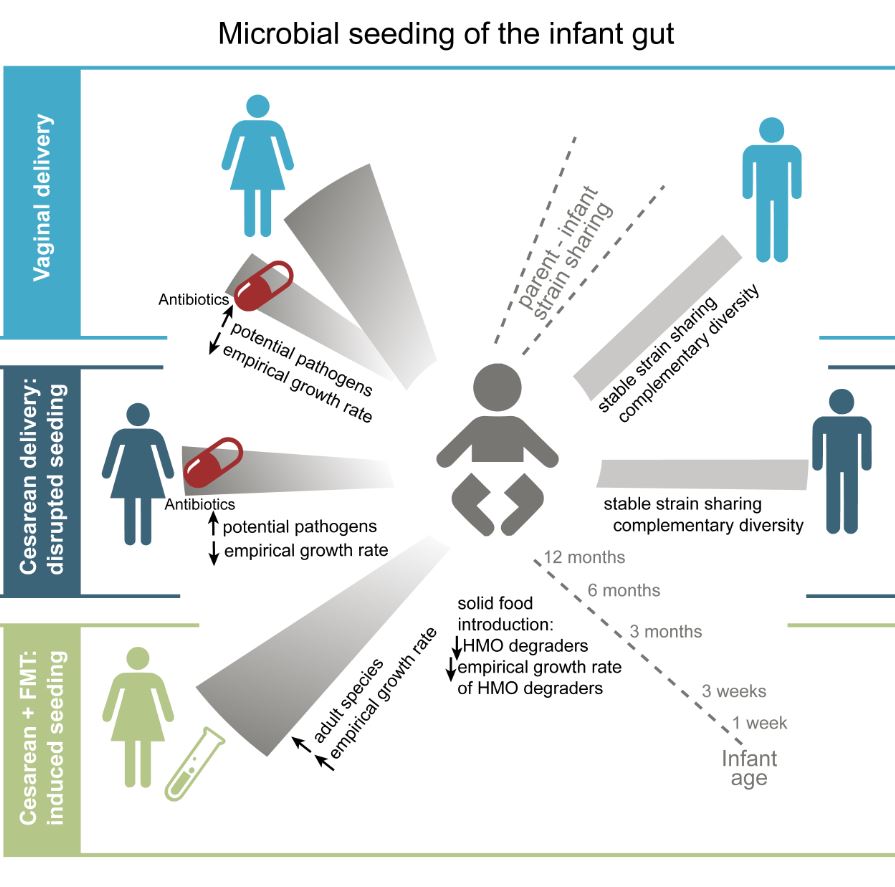Study Shows Role of Fathers in Seeding the Microbiota of Newborns and Confirms Benefits of Maternal FMTs
Study Shows Role of Fathers in Seeding the Microbiota of Newborns and Confirms Benefits of Maternal FMTs
This is an international study led by Universities of Wageningen, Helsinki and Trento with the participation of UPF that describes, for the first time, the role of fathers complementing newborn microbiome assembly independently of mode of delivery.

A mother’s contribution to the makeup of a newborn baby’s microbiota has been well documented. Now, a new paper published today in Cell Host & Microbe shows the important contributions that fathers make to the composition of microorganisms colonizing a baby’s gut. Furthermore, the study confirmed that maternal fecal microbiota transfer (FMT) in babies born by caesarean section can help to correct the microbiota disturbances often observed in babies who are not born vaginally.
Fetuses have sterile gastrointestinal tracts, and babies’ bodies are colonized during and shortly after birth. About half of the strains found in infants’ bodies can be traced to the maternal gut. This led the researchers to hypothesize that other people who have close contact with the infant could contribute to the rest, providing a stable source of microbial strains associated with good health.
“This study provides significant insight into how a newborn is colonized,” says senior and co-corresponding author Willem M. de Vos, of Wageningen University and the University of Helsinki. “The role of the father may be small, but it is not to be neglected. It is likely that the same holds for others who have close contact with the newborn.”
“We are very happy to have found this connection,” adds co-corresponding author Nicola Segata of the University of Trento. “This highlights the importance of studying other microbial contributions as well, such as those from siblings and from daycare peers." Segata’s group provided computational analysis, while de Vos’s group designed the study.
Infants receive their first microbiota from their mothers, but other individuals nearby (like the fathers) complement their contribution
“Last year, we showed there is extensive microbiome transmission among adults in close social contact. We are excited to now have the confirmation this is also the case in infants: they receive their first microbiota from their mothers, but other individuals nearby (like the fathers) complement their contribution. This is especially important for infants born by Cesarean delivery.”, adds Mireia Vallès - Colomer, researcher at Pompeu Fabra University and cofirst author of the study.
Parent-infant interaction essential to complete the neonatal microbiome
Inspired by his own experiences as a parent, for many years de Vos has studied the microbiota of infants and how babies’ gastrointestinal tracts become colonized after birth. In October 2020, he and colleagues published a proof-of-concept study in Cell that confirmed exposing caesarian-born newborns to their mother’s microbiota just after birth was both safe and effective at giving the babies a microbial makeup that looks more similar to babies born vaginally. The babies were fed a small amount of their mothers’ fecal microbiota shortly after birth.
This new paper provides follow-up data on that study, as well as new research looking at the contributions of fathers to infants’ microbial makeups. The authors say that because caesarian births now account for about one-quarter of births worldwide, there should be an increased focus on creating a health balance of gut microbiota in these infants.
The investigators performed metagenomic analysis of fecal samples from newborns and their parents. They looked for the presence of a wide range of bacterial strains over time. For the babies who were part of the earlier study, they confirmed through follow-up analysis up to a year later that maternal FMT reduced the levels of potential pathogenetic bacterial strains significantly for up to a year.
For the newer study, they compared the fecal microbiomes of babies (21 infants were born by caesarian section and 52 vaginally) longitudinally sampled over a year to those of both their mothers and fathers. They found that many of the strains found in the babies at 3 weeks, 3 months, and 12 months originated in the father, not in the mother. These include Bifidobacterium longum strains that are known to utilize mother’s milk oligosaccharides but counterintuitively may originate from the father rather than the mother.
“Knowing that the father substantially contributes to a baby’s developing microbiome underlies the important role of physical and social interactions between the newborn and their father, as well as with other family members,” Segata says. “We hope this study will help to create awareness of those important contributions."
The results of this study stem from international collaboration with researchers from the University of Wageningen Helsinki and Trento, that have led the study, with Pompeu Fabra University, Helsinki University Hospital, the Finnish Institute for Health and Welfare and the IEO European Institute of Oncology IRCCS.
Reference Article:
Dubois et al., Paternal and induced gut microbiota seeding complement mother-to-infant transmission, Cell Host & Microbe (2024), https://doi.org/10.1016/j.chom.2024.05.004
